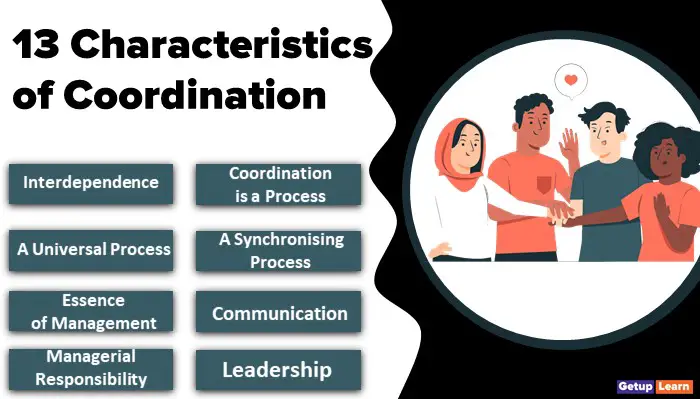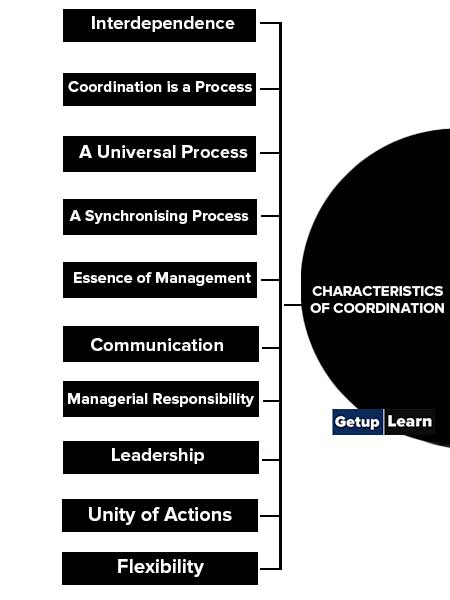
Table of Contents
- 1 Characteristics of Coordination
- 1.1 Interdependence
- 1.2 Coordination is a Process
- 1.3 A Universal Process
- 1.4 A Synchronising Process
- 1.5 Essence of Management
- 1.6 Communication
- 1.7 Managerial Responsibility
- 1.8 Leadership
- 1.9 Unity of Actions
- 1.10 Flexibility
- 1.11 An Activity Exercised to Achieve Common Objectives
- 1.12 Required at all Levels
- 1.13 Distinct from Cooperation
- 2 FAQ Related to Characteristics of Coordination
Characteristics of Coordination
Coordination refers to the process of aligning the activities of multiple individuals or groups in order to achieve a common goal or objective. There are several key characteristics of coordination that are important to understand.
These are the characteristics of coordination explained below:
- Interdependence
- Coordination is a Process
- A Universal Process
- A Synchronising Process
- Essence of Management
- Communication
- Managerial Responsibility
- Leadership
- Unity of Actions
- Flexibility
- An Activity Exercised to Achieve Common Objectives
- Required at all Levels
- Distinct from Cooperation

Interdependence
Coordination involves the alignment of activities that are interdependent, meaning that they are mutually dependent on each other.
Coordination is a Process
Coordination is a process which goes on continuously. The need for coordination is a continuing process.
A Universal Process
Coordination is a universal process. The need for coordination arises in all types of organisations like business, economic, social, political and religious.
Wherever two or more persons jointly strive for the attainment of a common goal, their efforts are required to be coordinated so that organisational goals can be achieved with the greatest efficiency.
A Synchronising Process
Coordination is the process of achieving uniformity in or integrating the activities of different departments and subdivisions, activities and efforts of persons working in a concern.
Essence of Management
Some scholars in the fields of management recognise coordination as a function of management like planning, organising, directing and controlling.
However, it is not merely a function of management but an essence of management. Renowned management authorities Koontz and O’Donnell have called coordination the essence of management.
Communication
Coordination requires effective communication between individuals or groups in order to share information and coordinate activities.
Managerial Responsibility
Coordination is the responsibility of a manager, especially, of the chief executive and he can not escape from this responsibility.
An orderly arrangement of group efforts-Co-ordination is the process of an orderly arrangement of group efforts. Its need is felt wherever efforts of more than one person are required.
Leadership
Coordination may require the guidance and direction of a leader or group of leaders in order to ensure that activities are aligned and objectives are achieved.
Unity of Actions
According to Henry Fayol “Co-ordination is the process of achieving unity of actions”. It is a device of establishing unity in diversity whereby goodwill and group feeling are developed among employees working in a concern.
Flexibility
Coordination requires the ability to adapt and respond to changing circumstances and new information.
An Activity Exercised to Achieve Common Objectives
According to Gulick “Co-ordination is that group of human and structural systems, the objective of which is to contribute to the achievement of common objectives of a concern”. As the freedom of units increases, the importance of coordination increases for the achievement of organisational goals.
Required at all Levels
Although coordination is the responsibility of the Chief Executive, it is required at all levels of management. There may be differences in degree but not of kind.
Distinct from Cooperation
Coordination and cooperation are distinct from each other despite being complementary to each other. Coordination is wider than cooperation.
Coordination is the orderly arrangement of group efforts to establish unity in diverse activities to attain common objectives, whereas cooperation is the result of the voluntary aptitude of employees working in an organisation.
What are the 13 characteristics of coordination?
The following are the 13 characteristics of coordination:
1. Interdependence
2. Coordination is a Process
3. A Universal Process
4. A Synchronising Process
5. Essence of Management
6. Communication
7. Managerial Responsibility
8. Leadership
9. Unity of Actions
10. Flexibility.
